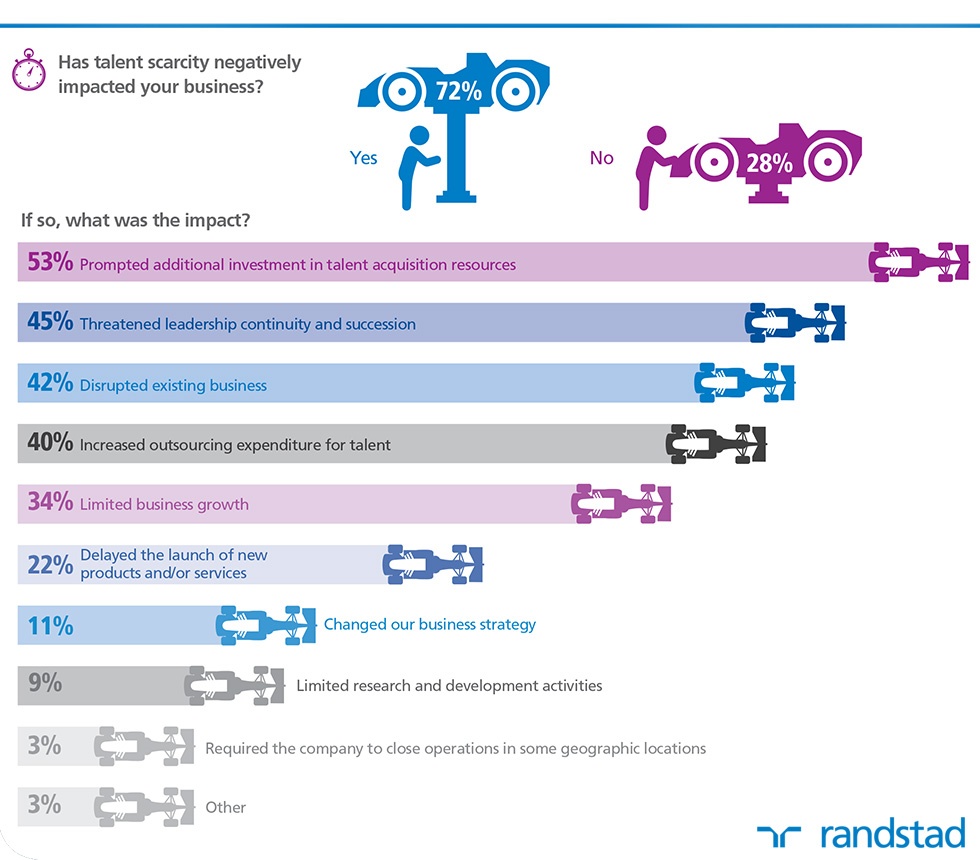CEOs once again express concerns about access to skills as competition for talent heats up.
In our 2016 Talent Trends Survey, 72% of respondents said talent scarcity has negatively affected their business, with 53% of those saying they need additional talent acquisition resources. Disruption to leadership continuity and succession was the
second-most cited result of talent scarcity, mentioned by 45% of participants. In third place was disruption to existing business.
In its 18th Annual Global CEO Survey, PwC found that 73% of CEOs say the availability of key skills is one of their top three concerns, second only to worries about overregulation. This is especially troubling because 50% say they plan to increase headcount in the next 12 months.
It’s easy to see why talent scarcity has CEOs up at night. With critical skills increasingly difficult to find, organizations are at risk of losing business because they are unable to execute due to lack of talent.

Last year, the Conference Board of Canada reported that British Columbia is losing as much as CAD $4.7 billion in economic activity and CAD $616 million in provincial tax revenues a year because local workers lack the skills needed by businesses. In 2014, the Centre for Economics and Business Research (Cebr) reported that the UK economy is losing out on £18 billion due to 520,000 job vacancies that small businesses are unable to fill due to a lack of skills.
What kind of skills do organizations need the most? Our survey indicates that knowledge workers (skilled professionals with hard-to-duplicate expertise such as salespeople, accountants, analysts and digital marketers) will be most in demand, followed by leaders (enterprising, multiskilled professionals who can lead organizational change, development and innovation).
With businesses and governments recognizing the impact that skills shortage and skills mismatch have on their economies, a number have taken to cooperative efforts to provide training and development opportunities. For instance, last November Randstad Holding announced the launch of the European Pact for Youth during CSR Europe’s Enterprise 2020 Summit. The program, supported by EU business leaders, the European Commission and the European Parliament, is aimed at helping young workers develop skills that are needed in the marketplace. This is just one example of many similar programs being funded around the world.
five tips to minimize the impact of talent scarcity on your business
- Look internally
Consider an early shift of talent from slower-growing business lines to fast-growing ones so you can capitalize on current market opportunities. - Reconsider traditional talent
With contingent talent becoming more accessible and agile, rethink the need for permanent hires for your positions. You may be able to fulfill your business mandate with a new wave of contingent workers. - Take a look at an outsourced solution
You can benefit from a project RPO, an MSP solution or simple staffing outsourcing when talent scarcity leaves you scrambling for workers. Explore how these options can help keep your business on track. - Look to government-sponsored programs
Many authorities and NGOs around the world have active training programs to prepare workers for the marketplace and to help businesses fill their job openings. Scope out your local and national nonprofit organizations and government agencies to see how they can help. - Create internships and training opportunities
Because aptitude is often cited to be more important than experience and education, you may find more success filling your roles by training candidates with the right aptitude than to find ones with perfect qualifications.


